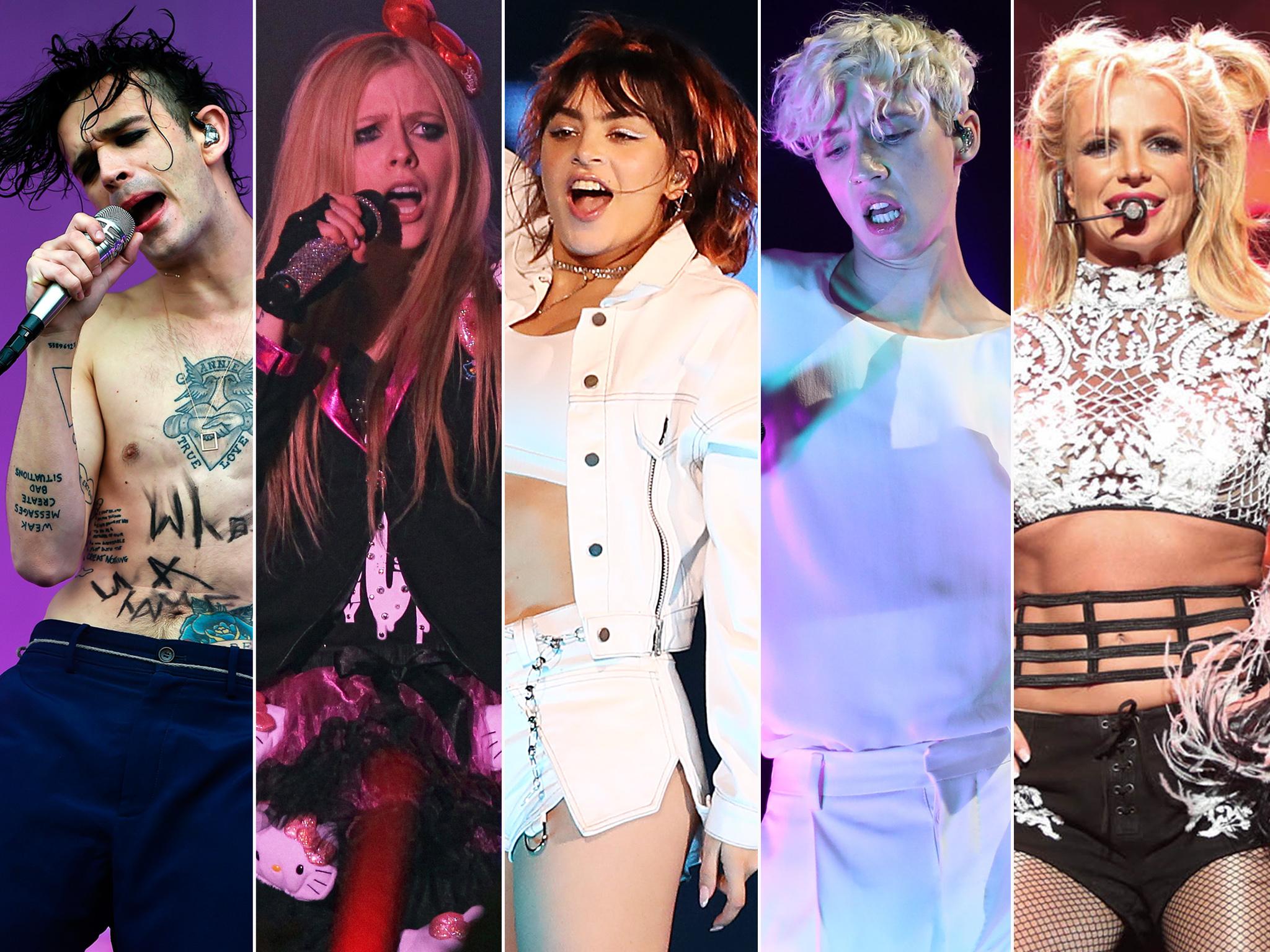'I just wanna go back': How nostalgia became the definitive pop trend
From The 1975's Eighties-drenched synth pop to Charli XCX and Troye Sivan on '1999', Ed Power wants to know why generations of artists tend to crave the era that came before

Your support helps us to tell the story
From reproductive rights to climate change to Big Tech, The Independent is on the ground when the story is developing. Whether it's investigating the financials of Elon Musk's pro-Trump PAC or producing our latest documentary, 'The A Word', which shines a light on the American women fighting for reproductive rights, we know how important it is to parse out the facts from the messaging.
At such a critical moment in US history, we need reporters on the ground. Your donation allows us to keep sending journalists to speak to both sides of the story.
The Independent is trusted by Americans across the entire political spectrum. And unlike many other quality news outlets, we choose not to lock Americans out of our reporting and analysis with paywalls. We believe quality journalism should be available to everyone, paid for by those who can afford it.
Your support makes all the difference.The latest sell-out tour by pop extroverts The 1975 is so retro that it’s a surprise concertgoers aren’t handed complimentary Rubik’s Cubes on their way into the venue. The state-of-the-art set is bathed in a fuzzy lava lamp glow that by turns recalls the opening credits of Rainbow and U2’s Zoo TV tour.
Equally steeped in nostalgia is singer Matty Healy’s persona – a delighted-with-itself mash-up of George Michael circa “Wake Me Up Before You Go-Go”, Peter Gabriel at the end of the “Sledgehammer” video and David Byrne in “Stop Making Sense” (with just a hint of “Back for Good”-era Robbie Williams).
A hankering for the past has always been a core component of pop’s DNA. Barely had the clock struck midnight on 1 January 1970 than David Bowie was releasing Memory of a Free Festival – a wobbly-lipped valentine to the idealism of the Sixties. Madonna was deeply influenced by the Fifties glamour of Marilyn Monroe. Where would Springsteen have been without that signature hankering for the mythic America of his post-war childhood? Back in New Jersey looking for a day job, probably.
What’s different is that today’s nostalgia is less a natural response to growing older than an act of wilful reminiscing by artists too young to have any meaningful memories of the era to which they are giving tribute. The 1975’s irrepressible Healy has, for instance, cited Fleetwood Mac’s “Everywhere” and Madonna’s “Into the Groove” as huge cultural signifiers no matter that the 29-year-old was born long after their mid-Eighties heyday.
He is also clearly indebted to Bowie – specifically the dark funk of the Thin White Duke’s Fashion/ Scary Monsters phase. And yet growing up in Manchester in the Nineties, Healy would be more exposed to the orange-haired Bowie of the Earthling era.
Far from outliers, The 1975 are merely part of what looks set to become the definitive pop trend as the decade slouches towards its close. Take “1999”, the dewy-eyed banger by Charli XCX and Troye Sivan, which offers unabashed homage to the tail end of the Nineties. Where once Prince immortalised the eponymous year as the ultimate sci-fi party zone, now it is looked back on as a font of cultural bric-a-brac.
“I just wanna go back, sing, ‘hit me, baby, one more time’,” croons 26 year-old Charli XCX. “Wanna go back, wanna go…Nike Airs, all that…CD, old Mercedes.”

Given that she was seven when Britney Spears had her break-out hit, it’s difficult to imagine Charli developing anything beyond the most child-like of relationships with the song first time around. And it’s even harder to picture the then primary-school attending Essex native “listening to Shady” as she brags in the tune.
“Never under pressure… those days where so much better,” chimes Sivan (23), who, as a worldly four-year-old in Western Australia, was presumably thrilled to get his hands on a new lozenge-coloured iMac – one of a parade of Nineties touchstones references in the accompanying video. The same promo also recreates the iconic King of the World moment from Titanic – disappointingly Charli plays Rose and Sivan Jack rather than the other way around – and has Sivan dressing up as Eminem.
Enjoy unlimited access to 100 million ad-free songs and podcasts with Amazon Music
Sign up now for a 4 month free trial (3 months for non-Prime members)
Enjoy unlimited access to 100 million ad-free songs and podcasts with Amazon Music
Sign up now for a 4 month free trial (3 months for non-Prime members)
But it is important to recognise that this isn’t simply a pop phenomenon. Even genres historically wary of sentimentality have caught the bug. Among a new wave of empowered and outspoken young female songwriters, for instance, a surprising recurrence is their devotion to early Noughties emo tomboy Avril Lavigne.
Dismissed at the time as cynical fluff, the Canadian’s scruffy skater anthems live on 18 years later in the music of artists such as Soccer Mommy and Snail Mail.
“I probably wouldn’t have made it to Elliott Smith without Avril Lavigne,” 24-year-old Phoebe Bridgers remarked last year. “You can just put those [first two albums] on in the car and every track – boom. Hit, hit, hit, hit,” Soccer Mommy’s Sophie Allison (21) told Billboard around the same time. “I remember thinking she was the penultimate [alternative] chick,” added 19-year-old Snail Mail singer Lindsey Jordan. “And I just wanted to be her so badly.”
Another component of this fractured jigsaw is the remarkable resurgence of Queen. By the mid-Eighties – their supposed pomp according to revisionists – Freddie Mercury and company were widely perceived as a primordial embarrassment. And this was after their performance at Live Aid in 1985, remembered today as the moment they achieved rock immortality.
That is certainly the picture painted by Oscar-tipped box office smash Bohemian Rhapsody, which reaches its crescendo with Mercury’s big Wembley moment. Yet in reality Queen were the popular punching bag of their era. A 1980 NME review of The Game – headline Flogging a Dead Pantomime – upbraided the group as embodying “everything that was depressing about music… emotional emptiness dressed up as spectacle”.
“Rock’s reigning champs of bad taste,” was how Rolling Stone meanwhile kicked off a review of A Kind of Magic in 1986, when the afterglow of Live Aid should still have been shining strongly. “The slapdash quality of these songs makes [Freddie Mercury] seem monumentally insincere,” it continued. “[Queen] are never going to make it as dignified elder statesmen.” Nobody took them seriously.
Nostalgia is obviously not confined to music. Netflix has tapped the collective hankering for times both simpler and grittier with Stranger Things. It is a trick HBO’s True Detective appears to have cribbed with its season three winks towards Advanced Dungeons & Dragons and the heavy metal panic of the early Eighties.
Nor is it any coincidence, surely, that the 2017 adaptation of Stephen King’s It – a love letter to the Eighties as much as a warning not to consort with clowns in drains – has become the most profitable ever horror movie. Meanwhile, the greatest trick Charlie Brooker played with his just released Black Mirror: Bandersnatch was to sneak a barefaced homage to the glory days of the ZX Spectrum onto Netflix disguised as a cutting edge interactive movie (which is, in turn, another form of Eighties tribute – to Choose Your Own Adventure books).
Even away from popular culture, nostalgia swirls through the bloodstream. What is Brexit but a pining for a dimly remembered time before butter quotas and qualified majority voting? Yet there is something about music that makes the instinctive yearning for the past so much more potent.
Consider the Spice Girls, unloved and unmourned when they petered out with Ginger-free third album Forever in 2000. Nor was there much excitement, outside of their admittedly considerable fanbase, for their 2007 comeback tour – which fizzled and died after just three months and with cancelled dates in Asia and Australia. Contrast that indifference with the hysteria over their forthcoming second return (excluding the London Olympics ceremony and also without Victoria Beckham), which has seen sold-out signs go up across the country.
The cynical diagnosis is that what we’re witnessing is a millennial phenomenon. This, after all, is Generation Instagram, whose virtual life is backlit by the vintage glow of a fake Polaroid filter, where nostalgia was for older generations a simple facet of growing older, the argument is that millennials were the first to commodify and repackage it.
But even a cursory survey of rock’ n roll’s medium-term history exposes the folly of such a line of thought. What was Britpop but a spiritual longing for the chirpy post-British Invasion music of the late Sixties and early Seventies? Blur were indebted to the Kinks even though Damon Albarn and Graham Coxon were too young to have first hand memories of Ray Davies’s imperial phase. Ditto Oasis’s worship of The Beatles, who released “I Am the Walrus” the year Noel Gallagher was born.
In other words, musicians have always had a fascination with the hazily recollected soundtrack to their childhoods. When The 1975 crib from Talk Talk or repurpose old Joy Division riffs (as they do on tour opener “Give Yourself a Try”) they are merely leaning into one of pop’s defining attributes. Nostalgia, it turns out, is as old as the hills.
Join our commenting forum
Join thought-provoking conversations, follow other Independent readers and see their replies
Comments